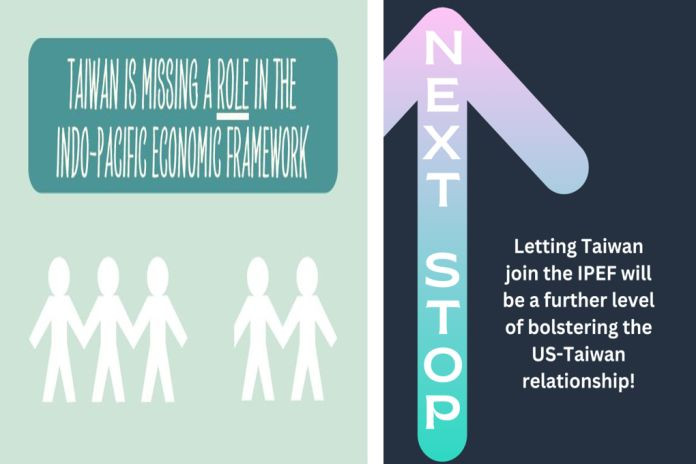By Caribbean News Global ![]()
TORONTO, Canada – It is with little amplification that facts and figures continue to ensure a democratic and free country, Taiwan’s critical role in the Indo-Pacific Economic Framework (IPEF), strategic initiative.
In a recent communique on the Benefits of Taiwan to the Indo-Pacific Economic Framework (IPEF), Taipei Economic and Cultural Office in Miami (TECO), Director-General Charles Chi-Yu Chou, outlined two fundamental facts and illustrated one IPEF pledge that points to “flexible and inclusive” why Taiwan’s inclusion in IPEF is crucial.
The United States and Taiwan, under the auspices of the American Institute in Taiwan (AIT) and the Taipei Economic and Cultural Representative Office in the United States (TECRO), have concluded negotiations on the US-Taiwan Initiative on 21st Century Trade. The negotiated text is available here.
The Joe Biden administration last October announced the Indo-Pacific Economic Framework (IPEF) with partner nations to “define our shared objectives around trade facilitation, standards for the digital economy and technology, supply chain resiliency, decarbonization and clean energy, infrastructure, worker standards, and other areas of shared interest.”
The 19-page strategy framework and objectives – taking into account current world challenges and Taiwan’s status in the international community, is now more obvious why the US should – #Let Taiwan join IPEF.
US Trade Representative Katherine Tai termed IPEF an opportunity to “tackle 21st-century challenges and promote fair and resilient trade for years to come.”
Taiwan’s IPEF connectivity
Promoting economic cooperation, strategic security and connectivity in the Indo-Pacific region is paramount to Taiwan’s strategic location. Thus, strengthening regional stability, enhancing connectivity, and promoting economic growth, in a key gateway connecting major markets in the Indo-Pacific region, East Asia, North America, Europe and beyond, is a proficient qualifier.
Taiwan’s global dominance in high-tech manufacturing and services – semiconductors – is a significant economic performer in the Indo-Pacific region, and the nexus in the global supply chains is paramount to dynamic economic growth.
Taiwan is a cohesive formula in the Indo-Pacific region (Japan, South Korea, and Southeast Asian nations) and a principal partner in promoting the principles of free and open trade, which are central to the IPEF.
The shared commitment to free and open trade makes Taiwan, a natural nucleus in advancing the strategic goals of the IPEF – promoting and upholding multilateral trade agreements, and maintaining an open and transparent global market, uninterrupted trade and logistics system.
Taiwan’s economic performance and political commitment to democracy and freedom in all aspects accompany the many reasons for its significant participation in the IPEF.
The importance of Taiwan’s critical role in IPEF, in the Indo-Pacific region, cannot be more relevant, given its strategic location, a democratic and free country with a strong economy, and commitment to free and open trade.
Becoming an active participant in international trade agreements and organizations, such as World Health Assembly (WHA), – Taiwan can help the global community to achieve commitments to Health for All, demonstrated by the country’s medical assistance to over 80 countries during the COVID-19 pandemic, donations to displaced Ukrainians and disaster victims in Türkiye.
For the past three years, Foreign Minister Jaushieh Joseph Wu noted Taiwan’s exclusion from WHA “has again failed to uphold its value of professionalism by ignoring prevailing international calls. Legislative bodies from around the world representing the G7 and EU member states have also shown their backing by passing bills and resolutions, for Taiwan to take part in WHA annual gathering as an observer, most recently May 21-30 in Geneva.
Taiwan is an independent and sovereign country and only the democratically elected government can represent Taiwan’s 23.5 million people in global organisations, meetings and undertakings, signing MoU’s and agreements, in particular, at the World Health Organization (WHO), the United Nations, and the World Trade Organization (WTO).
Engagement as a responsible member of the international community assists to strengthen global public health, economic cooperation, strategic security and connectivity.
Taiwan’s growth and development
Global positioning is significant for Taiwan’s growth and development. Specialized agencies affirm relationships to expand decisions, policies, and procedures for multilateral cooperation.
Taiwan is contributing immensely, on a regional and global scale, working with like-minded partners such as the US to deal with global challenges and contribute more to the global community.
Taiwan plays a vital role in the success of global economic growth and connectivity and will continue working with like-minded partners for Taiwan’s participation in The Comprehensive and Progressive Agreement for Trans-Pacific Partnership (CPTPP).
‘Premier Su Tseng-chang recently touts Taiwan’s economic performance,’ stating:
“We must also make legal and institutional preparations for our application to become a member of the Comprehensive and Progressive Agreement for Trans-Pacific Partnership, win the support of current member states while also formulating appropriate plans and complementary measures for vulnerable industries, and strengthen the competitiveness of domestic industries so that Taiwan can expand internationally.”
Taiwan’s geographic position is a vital partner in achieving global goals, and is thus, relevant to discussions regarding IPEF global economic governance and trade policies, given Taiwan’s critical gateway to global markets.
Securing trade and investment with Taiwan in the year of the Rabbit
Taiwan’s critical role in IPEF and the contributions it can make reverberates considerably in defense of the rules-based international order and economic coercion in the Indo-Pacific region and globally.
Understanding the Indo-Pacific region, US-Taiwan and like-minded allies’ strategic security, economic goals and policy is necessary to encounter present and future global challenges.
Excluding Taiwan from IPEF undermines the Indo-Pacific region and the global community.
#Let Taiwan join IPEF





